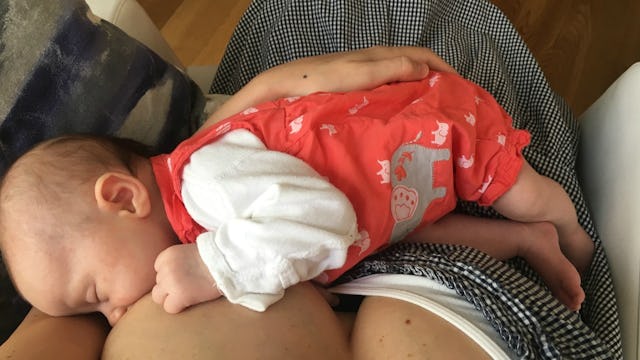I Was Supposed To Be The Chill ‘Fed Is Best’ Mom, So Why Am I So Obsessed With Breastfeeding Exclusively?

“What the fuck is going on here?” I said after emerging from a four-hour long nap—the longest stretch of sleep I’d enjoyed since giving birth ten days earlier.
But I knew exactly what was going on. I could see my significant other sitting casually in my nursing rocker, feeding our newborn daughter a bottle of the freebie formula some company had sent us while I was pregnant.
“I thought you’d be happy. This way, I didn’t have to wake you up. You needed the sleep,” my partner replied.
He was right. I did need the sleep. I was a walking zombie. Still, I was enraged.
“Stop. Right. Now,” I said. Then I rushed over to scoop my baby into my arms and hurled that disposable two-ounce bottle across the room before continuing my rant: “You’re going to fuck up my milk supply if you supplement with formula behind my back!! She could get nipple confusion! What if she hates my breasts now!?!?!? WHY ARE YOU DOING THIS TO ME?!?!?!?”
“She was hungry!” he said. “And since when do you care so much whether our kid eats breastmilk or formula? I thought you were part of the ‘fed is best’ camp.”
Right again. This breast-is-best craziness wasn’t supposed to infect me.
Throughout my pregnancy, whenever friends, family members, or strangers asked if I was going to breastfeed, I always chimed, “I’m going to try my best!” I prided myself on approaching the matter rationally, understanding that there was another person—my unborn daughter, whom I hadn’t even met yet—who factored into the equation. If it worked out—great, I figured. If not, I would just give the baby formula. After all, I knew many a formula-fed baby turned brilliant grownup.
Mélanie Berliet for Thought Catalog
Plus, I’d done my research. From what I could gather, diehard breasties were as unnecessarily vigilant as the women who forgo all alcohol, caffeine, sushi, deli meats, and soft cheeses for 40 straight weeks during pregnancy. With the teachings of Emily Oster—the economist who famously challenged the rules
about what a pregnant woman should and shouldn’t consume—tucked inside my proverbial back pocket, I was the relatively relaxed knocked-up lady who sipped a glass of wine and ate a slice of prosciutto flatbread here and there without an ounce of guilt. Believing that this easygoing attitude was healthiest for me—and, by extension, my fetus—I wanted to carry it with me into the “fourth trimester.” I wanted to trust the research questioning the breast-is-best message, just as I’d embraced Oster’s well-reasoned arguments disputing preconceived notions about pregnancy.
Indeed, there was plenty of evidence to counter the philosophy that breast milk was absolutely necessary if I wanted the absolute best for my baby. In The Case Against Breastfeeding, Hannah Rosin derails popular assumptions surrounding breast milk after examining dozens of related studies. If anything, she says, the medical literature “shows that breastfeeding is probably, maybe a little better…” but the conclusions of scientists look nothing like the breast-is-best fanaticism that dominates popular literature on the issue.
It wasn’t hard to find impassioned accounts by fearless formula feeders, either. Women like Claire Zulkey, who unapologetically rejects the tendency to label formula feeders “seflish,” seemed to mirror my attitude towards motherhood in general. I wanted to be an empowered, girl-boss mama who wouldn’t cave into conventional wisdom but would instead plow her own path, serving as an envelope-pushing example to her young daughter.
I was supposed to just go with the alternative if breastfeeding proved difficult (it did). And I was supposed to be calm and collected if and when I walked in on my partner nourishing my baby with a bottle of formula.
So why the fuck did I freak out? Why was I suddenly so obsessed with breastfeeding exclusively? How exactly did society penetrate me with its breast-is-best propaganda?
Breastfeeding is hard. But the trouble I experienced early on didn’t deter me from exhausting myself, physically or mentally, in the name of this allegedly natural process. Instead, my nursing nightmare seemed to propel me further into the must-feed-my-baby-a-boob-juice-only-diet vortex.
Baffling, right?
Unless you consider the hormones at play. Lisa Grace Byrne puts it eloquently: “For many of us, our journey into and through motherhood is full of heavy and layered emotional experiences. These experiences all have correlating physical and hormonal counterparts.”
While it’s easy to intellectualize that breastfeeding may not be the only healthy way to feed your baby, I know now that I cannot underestimate my own biology. For whatever reason, something inside me has been driving me to breastfeed—in spite of how difficult it was to get my baby to latch at first, and, six months later, in spite of how much I hate pumping at work. Is this the very drive that led me to get knocked up in the first place? I cannot say. But I definitely can’t ignore it, either.
In fact, I must admit that I feel a tinge of pride every time I catch my partner gazing at me longingly while I feed our child from my breast. And the oxytocin-laced bonding that happens whenever my baby curls up against my chest and suckles is unmistakably rewarding.
When it comes to feeding a child, I still believe that every woman should make her own choice irrespective of public opinion. But I would also advise expectant moms not to go into motherhood with too many set opinions. What I’ve learned so far is that being a parent will trample your assumptions about so many things. Because even if you’re not a slave to societal norms, you might just be a hostage to your own biology.
This article was brought to you by Thought Catalog and Quote Catalog.
This article was originally published on